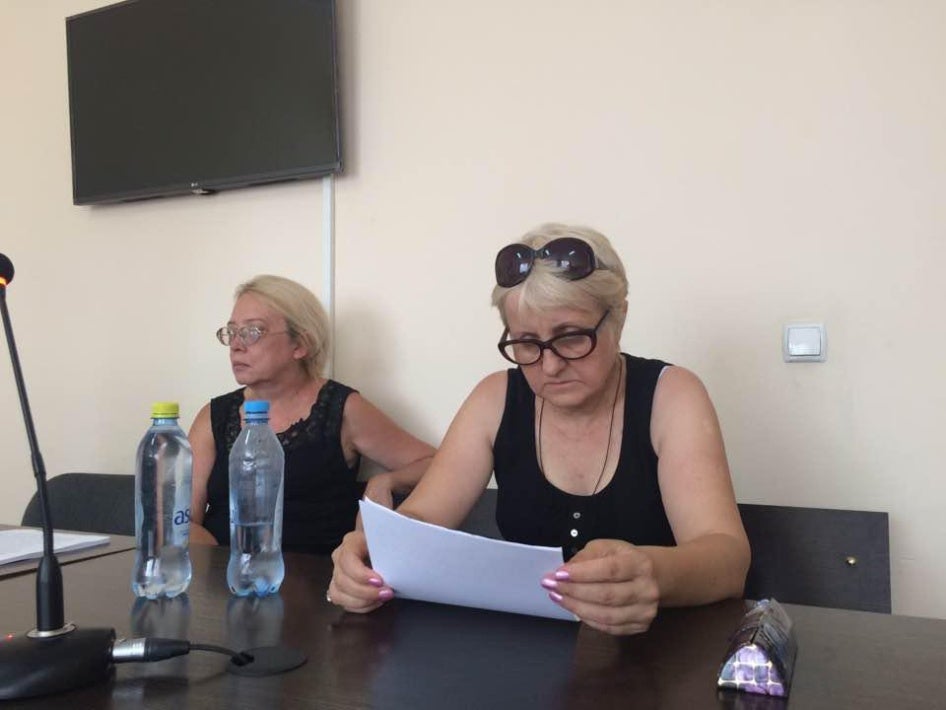(Berlin) – A Kazakh court on July 25, 2017, convicted Larisa Kharkova, head of the Confederation of Independent Trade Unions of Kazakhstan, of abuse of office, Human Rights Watch said today. The conviction is a blow to independent trade union activism in Kazakhstan.
The Enbekshinskii District Court in Shymkent, a town in southern Kazakhstan, sentenced Kharkova, 54, to 400 hours of community service and banned her from holding a leadership position in any nongovernmental organization, such as a trade union, for five years. It also imposed restrictions on her freedom of movement, including to live and work where she chooses, for four years.
“Larisa Kharkova’s conviction and the restrictions on her trade union activities is another nail in the coffin of the independent trade union movement in Kazakhstan,” said Mihra Rittmann, Central Asia researcher at Human Rights Watch. “The government should immediately stop its relentless attempt to suppress workers’ rights and allow Kharkova to continue her work.”
Kharkova’s prosecution followed the closure of the confederation and the imprisonment of two other trade union leaders earlier in 2017. The actions demonstrate the government’s clear disregard for freedom of association and trade union rights, Human Rights Watch said.
The Confederation of Independent Trade Unions of Kazakhstan has been the country’s largest independent trade union confederation. Since the adoption of a new trade union law in 2014, Kharkova has led the confederation’s efforts to comply with the law’s burdensome two-step registration process.
Under Kharkova’s leadership, the confederation has been outspoken in its criticism of the trade union law, including at this year’s International Labour Conference in Geneva, where the International Labour Organization (ILO) scrutinized Kazakhstan’s record on freedom of association for the third year in a row.
In January, Kazakh authorities shuttered the Confederation of Independent Trade Unions of Kazakhstan for not registering in accordance with the restrictive 2014 Trade Union law.
In separate trials in April and May, Nurbek Kushakbaev and Amin Eleusinov, confederation members, were sentenced to two-and-a-half years and two years in prison, respectively, on charges widely seen to be politically motivated. Courts also imposed a multi-year ban on trade union activities on both men.
Authorities brought the criminal case against Kharkova on January 9. Kharkova was initially under investigation on criminal charges of “embezzlement” and “fraud,” which carry a maximum sentence of 12 years in prison. The charges stem from allegations by two former confederation members, who claimed Kharkova had taken property and misused trade union funds. But in his concluding arguments, the prosecutor asked the court to revise the charge to “abuse of office.”
Kharkova has denied any wrongdoing. She told Human Rights Watch she will appeal her conviction.
Kharkova’s lawyer, Dina Volkova, told Human Rights Watch that the prosecution did not present any material evidence of financial misconduct. She said it appeared that the “main objective was to bar Kharkova from engaging in trade union activities.”
In her closing statement, Kharkova raised serious concerns about the conduct of the investigation. The investigator questioned her without the presence of a lawyer and without informing her that her testimony could be used as evidence against her. The investigator did not allow Kharkova to see the complaint filed against her until May, and did not permit Kharkova to confront her accuser, a violation of the Kazakh criminal procedural code and of basic standards of due process.
Kharkova also said the investigator had harassed her, summoning her for questioning every day during the six-month investigation, including on weekends and holidays.
International and domestic observers attended Kharkova’s trial, including representatives from the International Trade Union Confederation (ITUC), of which the Kazakhstan confederation is a member; the Center for Social and Labor Rights in Moscow; the Kazakhstan International Bureau for Human Rights and Rule of Law; and the U.S. Consulate General in Almaty.
Kazakhstan’s international partners should voice serious concern at the highest levels about Kharkova’s conviction, Human Rights Watch said. They should also press the Kazakh government to release Kushakbaev and Eleusinov, and to register the confederation.
Kazakhstan’s partners should similarly urge the Kazakh government to act on the ILO Committee on the Application of Standards’ conclusions issued earlier in 2017 and immediately take meaningful steps to improve labor rights protections in Kazakhstan.
“The Kazakh government should end this labor rights crackdown now,” Rittmann said. “The government should lift restrictions on Kharkova, release jailed unionists, and allow the confederation to continue its work protecting the rights of workers in Kazakhstan.”
|
News Release
Kazakhstan: Trade Union Leader Convicted
Sentence Stifles Labor Activism
Your tax deductible gift can help stop human rights violations and save lives around the world.
Region / Country
Most Viewed
-
November 25, 2019
A Dirty Investment

-
June 3, 2025
“They’re Ruining People’s Lives”

-
December 21, 2023
Meta’s Broken Promises

-
January 25, 2024
“We’re Dying Here”

-
November 12, 2018
“Shall I Feed My Daughter, or Educate Her?”




